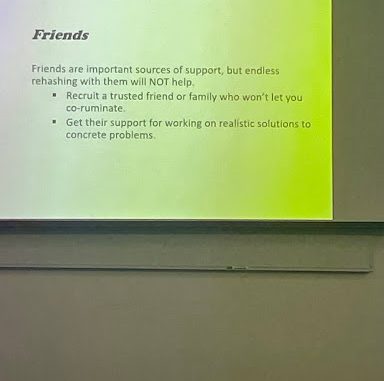
SUNY New Paltz journalist, author and professor Lisa Phillips presented “The Relationship Workshop: Breakups” on the evening of Feb. 27. The workshop was hosted by the Title IX Working Group and was held in the Student Union Building (SUB) 62/63 from 5 p.m – 6 p.m.
This workshop session was adapted from Stony Brook University’s Relationship Development Center, and from the Department of Psychology’s director Joanne Davila, Ph.D.
The workshop is applicable to various relationships — not just romantic or intimate ones. The event had a great turnout of approximately 40 attendees. Sweet treats were provided to guests, including hot chocolate and cookies.
Professor Phillips provided an interactive presentation experience, and attendees received a pen and paper to take notes on or to answer questions when prompted. She engaged in open discussions during each segment of the slideshow, allowing guests to provide their experience input or to give advice for others.
The presentation was divided into different segments including the foundation of healthy relationships, guiding principles of breakups, why breakups are hard, what to do when rejected and dealing with breakups. Professor Phillips also delved into the problematic reactions one can have to a breakup.
The six common problematic reactions she discussed are rumination, low distress tolerance, seeking support from the ex, impulsivity, idealizing the ex/denying reality and criticizing or blaming oneself. The foundation of healthy relationships and the skills involved are insight, mutuality and emotion regulation. Guiding principles of breakups are that those involved could not, did not, or would not meet each other’s needs — considering a breakup signifies someone does not want what the other has to offer. A good support system can be very beneficial, which could be friends, family or an acquaintance. Following a breakup, one may need to build new relationships to avoid alienating oneself.
Professor Phillips shared that breakups are hard since love and addiction are closely linked and people in love show activation in reward centers of the brain, which are the same parts of the brain associated with drug addiction. This is why love feels good and leads one to want more of it.
When someone is rejected, professor Phillips said that they continue to show activation in reward centers and in parts of the brain associated with attachment and physical pain — reflecting painful missing/craving association with withdrawal. In a Psychology Today article written by professor Phillips, she reveals that Tylenol has been scientifically proven to help ease post-breakup pain.
Dealing with breakups can include navigating the emotional consequences, such as lack of acceptance and unresolved emotions, mental health stability and the feeling of wanting them back, which can inevitably lead to the “break-up make-up game.”
Aside from the extracurricular workshops, Professor Phillips teaches the “Love and Heartbreak” honors course, which is offered every other year.
